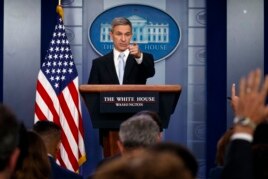14 August, 2019
"Give me your tired, your poor, your huddled masses yearning to breathe free..."
Those words were written by poet Emma Lazarus and placed on the United States' Statue of Liberty. Since 1903, they have welcomed millions of immigrants as they entered New York harbor.
Now, a top U.S. official says the words mean "give me your tired and your poor who can stand on their own two feet and who will not become a public charge."
Ken Cuccinelli is the acting director of U.S. Citizenship and Immigration Services. On Tuesday, he told NPR that the words from Lazarus were "put on the Statue of Liberty at almost the same time as the first public charge law was passed."

Acting Director of United States Citizenship and Immigration Services Ken Cuccinelli, speaks during a briefing at the White House, Monday, Aug. 12, 2019, in Washington. (AP Photo/Evan Vucci)
New rule on public charge
Cuccinelli's comment came a day after he announced a new rule to deny green cards to immigrants who become a "public charge."
He said the Immigration Act of 1882 has always required foreign nationals to rely on their own resources, with help from relatives and others. But the term "public charge" was never clearly defined. He added, "That is what changes today with this rule."
The immigration services now say a "public charge" is a person who receives "public cash assistance" or "long-term care at government expense."
Reporters later asked U.S. President Donald Trump about Cuccinelli's comments on NPR. Trump said, "I don't think it's fair to have the American taxpayer paying for people to come into the United States."
But Democrats and immigration supporters condemned Cuccinelli's comment. They said the policy would favor wealthy immigrants over those from poor countries in Latin America and Africa.
Charles Wheeler is with the Catholic Legal Immigration Network. He said the new policy is "really a backdoor way of prohibiting low-income people from immigrating."
One Democratic presidential candidate, Beto O'Rourke, added "This administration finally admitted what we've known all along: They think the Statue of Liberty only applies to white people."
Another Democratic presidential candidate, Massachusetts Senator Elizabeth Warren, tweeted, "Our values are etched in stone on the Statue of Liberty. They will not be replaced."
Despite the criticism, Cuccinelli said in an interview with CNN later on Tuesday night that Lazarus' words referred to "people coming from Europe." He said Europe had "class based societies where people were considered wretched if they weren't in the right class."
Who will be affected?
The U.S. government estimates the new "public charge" policy could affect the status of about 382,000 immigrants. Immigrant supporters say the real number could be much higher. It will especially go up if the rule is extended to the millions of people who apply for U.S. visas at American consulates around the world.
Since January 2018, the U.S. State Department has already given diplomats the ability to deny visas on public charge grounds. The number of visas denied on those grounds has since increased four times compared to the previous year.
Others are concerned the rule could negatively affect public health by discouraging immigrants from using health or food aid. The Trump administration estimates the new rule will save $2.47 billion a year in spending on public benefits.
I'm Kelly Jean Kelly.
Hai Do adapted this story for Learning English based on reporting by the Associated Press and Reuters. Kelly Jean Kelly was the editor.
Write to us in the Comments Section or on 51VOA.COM.
______________________________________________________________
Words in This Story
huddled - adj. in a group of people or things close together
masses - n. a large group of people
yearn v. - want something very much
apply - v. to use (an idea, method, law, etc.) in a particular situation
etch - v. to produce words or images by using a powerful liquid to cut the surface of metal or glass; often used figuratively to mean having an experience that will not be forgotten
wretched - adj. very unhappy, ill, etc.